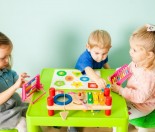Making the shift back into school mode can be tough for children and parents. If you’re feeling a bit nervous about making the switch, here are 5 key routines for back to school to help make the new term easier for you and your child.
Children find comfort in daily routines, whether it’s bedtime, meals, getting up in the morning or getting ready for school. When school finishes at the end of the year and the excitement of Christmas and the holidays reaches a high, schedules tend to get disrupted. Suddenly we are faced with the new school year and we recognise a need to reintroduce some routines again.
The new school year can be very unsettling for a younger child and just a jolly interference in their social lives for the teenage student. For all ages it is important to slow your children down and slowly reintroduce some normalcy in the week or two leading up to the new school year.
Routine and ritual will help them to feel more secure, less distracted and ready and enthusiastic about learning.
5 key routines for back to school
For younger children
1. Morning Moments
For younger children the journey that is getting ready for school each day is a battlefield of fabulous distractions! Toys, television, a pantry of exciting new foods, brothers and sisters…. The key to getting ready and out the door on time is establishing a “Getting Ready” routine.
A morning routine might begin with a family snuggle and play before officially getting up. Some children ‘wake’ more slowly and need to snuggle/snooze before being able to bounce into the day. Others spring to life as soon as the sun rises.
The next part of the routine could be to consult a list of “Getting Ready To-Dos”. Ask your child what they think they need to do to get ready for school in the morning. Giving them some ownership over the list will give them a sense of responsibility.
A ‘To-Do’ list might look like this –
- Get dressed into my school gear
- Make my bed
- Have my book bag / library bag in my school bag
- Eat my breakfast
- Brush my teeth
- Is my bag ready? Lunch box, hat, water bottle, book bags etc.
For your younger child a visual chart may help them to identify what they need to do more independently. You could add another ‘responsibility’ dimension by allowing them to tick boxes when they have completed each task.
Be reasonable about what you expect them to accomplish and then reward them when they’ve completed their tasks. A great reward for being ready before time could be watching telly until it’s time to go.
2. After school
Remember that after school your little one may be very tired, especially during the first few weeks of term. Add to that the fact that he/she may not have eaten their lunch because the game on offer was much more exciting, and it would be fair to say you could have a monster walk through the door rather than the angel that left that morning!
Establish an after-school routine early. It might start with your child being responsible for taking their lunch box and drink bottle out of their bag as soon as they get in. If your child wears a uniform to school you could choose at this point whether or not you want them to get changed.
Check pretty soon whether or not they are hungry and offer a snack. It’s a good idea to let them have a short wind down/quiet time. There are a lot of exciting, busy things going on at school in a day and they may not want to be hounded with conversation and questions just yet.
Once they have recovered it’s a good time to hit the homework. Leaving it till too late in the day or evening will cause clashes with dinner and other chaos and often striking while the iron is hot is the best policy. For more tips on homework read the Helping with Homework section of the Primary – What part can I play? article.
Once all this is done and over with they may be allowed free time or the after-school treat they have been able to choose, see Back to School – First Day Anxieties.
3. Bedtime
Not getting enough sleep can create serious problems in school-aged children.
It may be that your child’s bedtime has crept out half an hour or so over the summer holidays. Try to cinch that time back in the week or two leading up to school. You’ll find they’ll need that extra sleep in the coming few weeks.
Try to keep bedtime leisurely and stress free. Rushing your child might make him or her feel you have enough time to spend with them and may make it harder than it needs to be.
Figure out a schedule that best fits your family but try to incorporate the following –
- quiet time together one-on-one,
- bath or shower,
- teeth brushing
- story time and
- a snuggle.
Story time can be adapted as your child gets older. It may be that they are old enough now to read their school reader to a younger sibling with you present as an eager audience member rather than storyteller. This is a great way to acknowledge how well your child is progressing with his or her reading skills and how ‘big’ they are getting now!
As they get bigger again story time could become their own reading time in bed before lights out. Just make sure you’re aware of the sleep needs for children at different ages.
For older children
There comes a point at which you need to give your older children more responsibility and allow them to establish their own routines.
Their routine should include making their own lunches, setting their own homework time, getting their uniform washed and so on. You are still there as a guide who will no doubt need to ensure these tasks get done.
4. Homework
You still have a part to play in homework with your older child. Your role will become more of a guide and ‘motivational speaker’ than a ‘sit-alongside-er’. Check out our 13 tips for helping kids with their homework for more ideas on how to make homework go smoothly in your household.
5. Social Life
The most important aspect of being a teenager, in most of their eyes, is the social life. It is important for you as a parent to establish some guidelines you feel are reasonable. How much time will be spent on the phone, on the Internet, visiting friends, going to movies and ‘functions’? The best time to do this is at the beginning of the new school year.
There needs to be a balance between, home, school and social lives. Discussing this calmly and quietly with your teenager to come to some agreement that suits you all is the best way to tackle the topic. From here you’ll be able to establish some routines for back to school collaboratively. Good luck for a calm, smooth-running household this year!
For another great read on setting up school term routines, check out Resetting sustainable routines after the holiday break. Or for more great schooling advice, check out our Back to school section.








